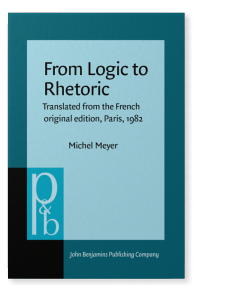From Logic to Rhetoric
Translated from the French original edition, Paris, 1982
What is language, and how has it been conceived since Frege? How did the development of thought about language lead to a renewed interest in rhetoric in the twentieth century and ultimately to the ‘problematological synthesis’? These are the main questions treated in this book. A constant intertwining of historical and topical viewpoints characterizes the author’s approach.
[Pragmatics & Beyond, VII:3] 1986. ix, 147 pp.
Publishing status: Available
© John Benjamins Publishing Company
Table of Contents
-
Introduction | p. 1
-
Part One: Logic and Language
-
1. Frege or the Recourse to Formalization | p. 3
-
1.1. Logic before Frege
-
1.2. Function and concept
-
1.3. The ideography and the principles of Fregean language theory
-
1.4. Sense and reference
-
1.5. Sense and meaning
-
1.6. Conclusion
-
2. Russell's Synthesis | p. 17
-
2.1. Formalization and natural language
-
2.2. Definite descriptions
-
2.3. Propositional functions
-
2.4. The theory of types
-
2.5. Conclusion
-
3. Wittgenstein: From Truth Tables to Ordinary Language and the Implications of Generalized Analyticity | p. 35
-
3.1. The Russellian heritage and its contradictions
-
3.2. The immanence of logic in language
-
3.3. Sense and reference
-
3.4. The language image (the picture theory of language)
-
3.5. Negation and the other logical constants
-
3.6. The Tractatus as initiation into silence
-
3.7. Ordinary language and its rules
-
3.8. Conclusion: Russell vs. Wittgenstein, a heritage
-
4. Hintikka or the Theory of Possible Worlds | p. 65
-
4.1. Introduction
-
4.2. Referential opacity
-
4.3. Ontological commitment and the elimination of single terms with Quine
-
4.4. Possible worlds and propositional attitudes
-
4.5. The implications of the alternativeness relation and the theory of modus
-
4.6. The ontological commitment
-
4.7. The interpretation of quantification as a question and answer game
-
4.8. Wittgenstein and Hintikka: A concluding comparison
-
Part Two: Language and Context
-
5. Syntax, Semantics, Pragmatics and Argumentation | p. 85
-
5.1. The three levels of language
-
5.2. Logical syntax
-
5.3. Formalization and natural language
-
5.4. The renewal of argumentation
-
5.5. Perelman's new rhetoric
-
5.6. Argumentation in language or the ‘new linguistics’ of Anscombre and Ducrot
-
5.7. Conclusion
-
6. Dialectic and Questioning | p. 99
-
6.1. Dialectic and Socrates
-
6.2. The middle dialogues: Dialectic and the hypothetical method
-
6.3. The late period: The question of being or the shift from the question to being
-
7. Argumentation in the Light of a Theory of Questioning | p. 115
-
7.1. Why language?
-
7.2. The two major categories of forms
-
7.3. What is to be understood by ‘question’ and ‘problem’?
-
7.4. The autonomization of the spoken and the written
-
7.5. The proposition as proposition of an answer
-
7.6. What is meaning?
-
7.7. Meaning as the locus of dialectic
-
7.8. Argumentation
-
7.9. Literal and figurative meaning: The origin of messages ‘between the lines’
-
Footnotes | p. 137
-
Cited by (12)
Cited by 12 other publications
Barseghyan, Hakob, Paul Patton, Guillaume Dechauffour & Carlin Henikoff
Lanigan, Richard L.
van Eemeren, Frans H., Bart Garssen, Erik C. W. Krabbe, A. Francisca Snoeck Henkemans, Bart Verheij & Jean H. M. Wagemans
van Eemeren, Frans H., Bart Garssen, Erik C. W. Krabbe, A. Francisca Snoeck Henkemans, Bart Verheij & Jean H. M. Wagemans
van Eemeren, Frans H., Bart Garssen, Erik C. W. Krabbe, A. Francisca Snoeck Henkemans, Bart Verheij & Jean H. M. Wagemans
van Eemeren, Frans H., Bart Garssen, Erik C. W. Krabbe, A. Francisca Snoeck Henkemans, Bart Verheij & Jean H. M. Wagemans
Turnbull, Nick
van Eemeren, Frans H. & Rob Grootendorst
van Eemeren, Frans H. & Rob Grootendorst
This list is based on CrossRef data as of 27 october 2024. Please note that it may not be complete. Sources presented here have been supplied by the respective publishers. Any errors therein should be reported to them.
Subjects
Philosophy
Main BIC Subject
CF: Linguistics
Main BISAC Subject
LAN009000: LANGUAGE ARTS & DISCIPLINES / Linguistics / General
